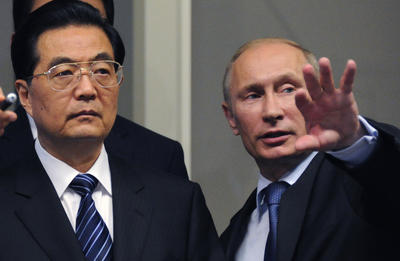Those sceptics saw Russia as a big and troubled power with minimal economic links to the Asia Pacific, whose entry into the forum would add little value and would only distract APEC from its core agenda of trade and investment.
This may not be the case any longer. Although Russia still has a long way to go to become an economic heavyweight in the Asia Pacific, its presence in the region is growing considerably. Russia is reorienting its trade ties away from Europe and toward Asia, particularly Northeast Asia. In 2010, China overtook Germany to become Russia’s biggest trading partner. Russia’s bilateral trade with China is expected to top US$90 billion in 2012 and is projected to reach US$200 billion by 2020. Moreover, Russia’s trade with Japan doubled between 2005 and 2010, and its trade with South Korea increased threefold during the same period. To be sure, much of that impressive growth is due to the expanding supplies of Russian oil and natural gas to Asian markets. Russia has become a major exporter of hydrocarbons to China, Japan and Korea.
Russia also entered into FTA negotiations with countries in the Asia Pacific. It is now negotiating an FTA with New Zealand, while Vietnam, Singapore and possibly other APEC economies are next on its agenda.
What are Russia’s key objectives and anticipated outcomes in hosting APEC?
First, Russia obviously wants to bolster its credentials as a true Asia Pacific power that can be a meaningful player in the regional cooperation. The priorities that Russia chose for its 2012 chairmanship — trade and investment liberalisation, regional economic integration, food security, reliable supply chains and innovative growth — are well in line with the forum’s established agenda. It also reflects Moscow’s desire to be seen as a conventional APEC member that cares for the region’s economic well-being.
Second, the Vladivostok summit is a chance for Russia to diversify its ties in the Asia Pacific beyond China. Of course, Beijing remains Moscow’s principal strategic partner, both in the region and globally, due to powerful economic and political reasons. But Russia is somewhat uncomfortable with its growing dependence on China and clearly wants to establish productive partnerships with more countries in the region. Japan is one obvious choice. Given that Barack Obama will not be attending the Vladivostok summit because of the close election race at home, Yoshihiko Noda could be the most important leader at the summit, apart from Hu Jintao and Vladimir Putin himself.
Russia does not need APEC to develop its ties with China further because the two countries already have well-established bilateral mechanisms, as well as the Shanghai Cooperation Organisation. But APEC could be of value for Russia’s relations with Japan, which can be characterised as tepid at best. This may also be true for Russia’s relations with the United States, Australia and other countries that represent APEC’s Pacific dimension. In other words, APEC presents Russia with an opportunity to improve its relations with the member economies that are less ‘Asian’ and more ‘Pacific’.
Finally, one of the key aims of hosting APEC in Vladivostok is to boost the development of the Russian Far East, a vast and resource-rich — although thinly populated — area that Moscow had long neglected. In 2007, the Russian government launched an ambitious program for the Far East development, committing to invest more than 1 trillion rubles (US$31 billion) over six years, an unprecedented sum for the region. Much of that funding is centred on Vladivostok. The city has undergone massive renovations, recently constructing three big sea bridges, highways, a state-of-the-art university campus (which will also serve as the APEC venue) and a modern airport terminal.
Russia’s emerging tilt eastward seems to be a long-term trend that will certainly outlive the 2012 APEC events. As Europe is seen in Moscow as stagnating and increasingly inward looking, Russia wants to align its national development strategy more closely with the Asia Pacific. Some prominent Russian public intellectuals even suggest making Vladivostok the third national capital, in addition to Moscow and Saint Petersburg, transferring to the city part of the federal government’s institutions.
The main outcome of the Vladivostok summit will not be about the Asia Pacific — no grand initiatives are expected to come out of the event. Rather, it will be about the host country itself, as its APEC chairmanship will help socialise Russia into Asia Pacific regionalism and, in a sense, changes the country’s identity — from predominantly Eurasian to Euro–Asia Pacific.
Artyom Lukin is Associate Professor of International Relations and Deputy Director for Research at the School of Regional and International Studies, Far Eastern Federal University, Vladivostok.

